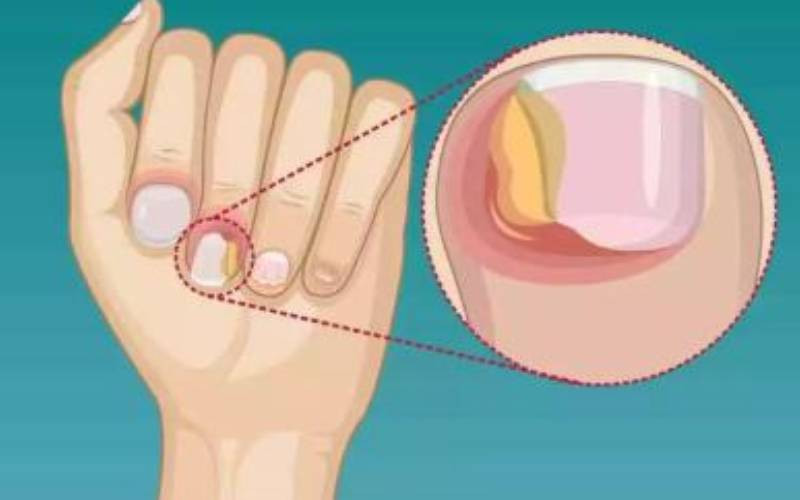
In the Majengo area of Nyeri town, Jane Muthoni washes her dishes with a lot of pain. One of her fingers is swollen and turned red.
"I finished washing my children's clothes using a detergent sold by a young man. When I started to feel pain in my finger, I visited a nearby chemist and I bought some painkillers. The attendant advised me to visit the hospital but I didn't have money to go to the hospital," Muthoni says.
Mary Wambui, Muthoni's neighbour says she had the same infection on her finger and also self-medicated with painkillers to dull the pain.
"The painkillers did not work. I washed my family's clothes using a certain detergent. Before I finished my finger started aching. At night the pain accelerated. My finger was so hot, it turned red," Wambui says.
She explains that the money she earns in daily laundry work is only enough to buy food for her family so she cannot afford to seek medical attention.
She says that, a year ago, she had a similar infection and stopped working for two months.
At her small shop at the nearby Gatitu Trading Centre, Pauline Wangari explains to her customer why she closed the shop two days ago.
"I was washing my family clothes in the morning three days ago using some new detergent but just before I finished my finger started to ache. The whole night I did not sleep. It turned red and was so hot, I soaked cold water for a while to relieve the pain," Wangari says.
She added that the following day she visited a health centre. A doctor prescribed some medicine and advised her to return after three days.
Dr Patrick Mbuthia a specialist based in Nyeri explains that the infection known as paronychia (nail infection) is usually caused by bacteria that gets into the skin through cuts in the cuticle and the nail fold (the skin around the nail).
He says that most nail infections get better with antibiotics.
"Paronychia doesn't usually cause serious health problems. It is a nail inflammation that may result from trauma, irritation or infection and can affect fingernails or toenails," he observes.

According to the US National Institutes of Health (NIH), paronychia is among the most common infections of the hand.
Paronychia is more common in women than in men, with a female-to-male ratio of 3 to 1, according to NIH and the infection usually affects manual labor workers or patients in occupations that require them to have their hands or feet submerged in water for prolonged periods. Middle-aged females are at the highest risk of infection.
Dr Mbuthia notes that healthcare providers treat paronychia with antibiotics to kill the infection also drain pus (thick, infectious fluid that builds up around a wound).
He says that there are two types of paronychia and they have similar signs and symptoms
Acute paronychia appears over hours or a few days. The infection is only in the nail fold and doesn't extend deeper inside the finger or toe. The symptoms go away with treatment and last less than six weeks.
The symptoms of chronic paronychia, on the other hand, develop more slowly and they usually last six weeks or longer. Several fingers or toes can be infected at once.
Dr Mbuthia explains that it is diagnosed by asking about the patient's symptoms and a physical exam.
He notes that healthcare providers take a sample of the tissue and send it to a lab to test for specific infectious causes such as bacteria or fungi.
"If the infection is severe, imaging including an X-ray may be ordered to check for the involvement of the underlying bone," Dr Mbuthia says.
He warns that patients should avoid biting or chewing nails, picking at cuticles and cutting their nails too short.
"When trimming cuticles, avoid cutting too close to the nail fold. Maintain good hygiene by washing hands and keeping nails clean," the doctor said.
More so use gentle soaps that are not irritating to the skin. Use lotion on the nail fold and cuticles if your skin is dry.
The doctor observed that excessive dryness can cause the skin to crack, adding that people should wear waterproof gloves when working with chemicals or if their hands will be wet for a long period.
Dr Mbuthia says that nail infections are common in females because of the influence of hormones on small blood vessel formation in these lesions.
He notes that nail infections can be painful, but they don't usually cause serious health problems.
 The Standard Group Plc is a multi-media organization with investments in media
platforms spanning newspaper print
operations, television, radio broadcasting, digital and online services. The
Standard Group is recognized as a
leading multi-media house in Kenya with a key influence in matters of national
and international interest.
The Standard Group Plc is a multi-media organization with investments in media
platforms spanning newspaper print
operations, television, radio broadcasting, digital and online services. The
Standard Group is recognized as a
leading multi-media house in Kenya with a key influence in matters of national
and international interest.




